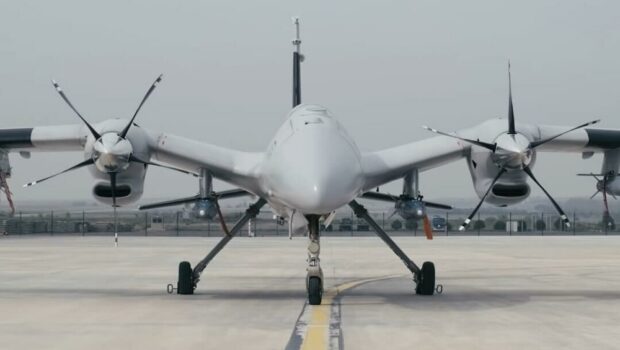Turkey’s landmark combat drone has undergone a successful firing test with a laser-guided missile, achieving yet another milestone in the integration process of domestically manufactured ammunition.
The Baykar Akıncı unmanned combat aerial vehicle (UCAV) on July 1st. precisely struck a target that was laser-marked by a Bayraktar TB2 unmanned aerial vehicle (UAV) flying sub-cloud, its developer Baykar said in a statement.
After taking off from northwestern Tekirdağ’s Çorlu district, Akıncı flew at an average altitude of 30,000 feet above the clouds during the test that marked the first time that a laser-guided LGK-82 missile, manufactured by another prominent Turkish defense contractor Aselsan, was fired from a UAV.
The LGK turns general-purpose bombs into smart ammunition that can hit targets from miles away thanks to laser marking.
The test came days after Akınci successfully completed a firing test with the domestically developed KGK-SIHA-82 (wing-assisted guidance kit) ammunition.
The electro-optical camera on the Akıncı and the telemetry antennas on the ground confirmed that the ammunition weighing 340 kilograms (750 pounds) hit the target 30 kilometers (18.64 miles) away with pinpoint accuracy.
The KGK-SIHA-82 useful load has been developed by TÜBITAK Defense Industries Research and Development Institute (SAGE).
In late April, the drone conducted the first live firing at a sea target in a test that saw it hit a target using a TEBER MK-82 guidance kit, developed by another defense giant, Roketsan.
It had hit a target laser-marked by Bayraktar TB2. Akıncı reportedly dropped the MK-82 bomb from an altitude of 20,000 feet onto a floating target.
Marking the most advanced and sophisticated drone built by the country, Akıncı was first delivered to the Turkish security forces in late August last year.
The UCAV joined the company’s Bayraktar TB2, which has been widely used and sold to various countries, including Ukraine, Qatar, Azerbaijan and Poland.
Six Akıncı drones have entered the inventory so far and have been actively used by the Turkish Armed Forces (TSK). They had joined their first major operation ever in April as Turkey launched a military offensive against PKK terrorist targets in northern Iraq.
Akıncı is longer and wider than the Bayraktar TB2 and can perform strategic tasks. It has a 20-meter (65-foot) wingspan with its unique twisted-wing structure and is equipped with fully automatic flight control and a triple-redundant autopilot system.
It can carry various weaponry, including a range of missiles such as Smart Micro Munitions (MAM-L) developed by prominent Turkish contractor Roketsan. It can be equipped with the locally produced active electronically scanned array (AESA) radar and air-to-air missiles Gökdoğan (Merlin) and Bozdoğan (Peregrine).
It is also able to launch several other types of locally made munitions, such as the Roketsan-built Stand-Off Missile (SOM), a long-range air-to-surface cruise missile that can hit targets up to 240 kilometers away.
Baykar says the Akıncı can attack targets both in the air and on the ground. It can also operate alongside fighter jets and fly higher and stay in the air longer than Turkey’s existing drones.
Baykar is said to have already completed Akıncı export deals with four countries so far, with negotiations with multiple other potential buyers continuing. It has managed to strike agreements with 22 nations for the TB2.
According to the company, Akıncı deliveries are aimed to be made periodically starting from 2023.
Baykar made sales worth $664 million in 2021, becoming the company with the highest exports in Turkey’s defense and aviation industry for the first time.
Source: Daily Sabah

